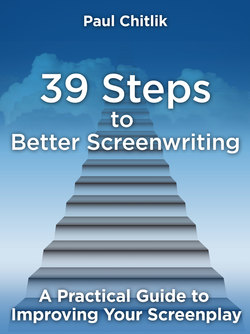Читать книгу 39 Steps to Better Screenwriting - Paul Chitlik - Страница 12
На сайте Литреса книга снята с продажи.
ОглавлениеStep 6
Balance
It’s often said that the key to life is balance, and I know that I’ve certainly tried to live that way. Too much partying leads to a desire to do good in society to balance things out. And it works the other way, too: Too much doing good means it’s time to party!
Balance also applies to your screenplay. A student of mine recently asked if it was okay to have a 30-page first act, a 30-page second act, and a 60-page third act. In a word, no. Of course, there are no rules in making movies. But there is a guideline here that is very important to follow.
In a 110 page script, you should have about 25–30 pages to set up the character and what s/he is going to do (the first act), and about 40–50 pages in the second act where the movie really gets going (i.e., your character goes after his/her goal). The third act is when your character faces himself and his final challenge, and it should be about 25–30 pages (all figures are fungible and are kept in proportion for longer stories). If you keep the audience waiting, they’ll get impatient.
The last act is usually the shortest act, and audiences expect that once your character pulls out of the funk he found himself in at the end of Act II, he’s going to do some ass kicking. You want to get to that, the most exciting part of your story, the one with the most tension and the most riding on it, as soon as you can and you want to make the final challenge the best and biggest scene of your film.
Does that apply to romantic comedies? Biographies? Action/adventure? Yes. It’s when the central character has to eat dirt and run across Manhattan and beg for forgiveness in a romcom; it’s when the biopic protagonist faces his greatest challenge; it’s when the action hero faces down the villain and the big fight takes place. If you keep your audience waiting for 60 minutes, you might as well kiss your word of mouth goodbye. The story will drag. It’s impossible to sustain a 60-minute final act. If you don’t think I’m right, go see Artificial Intelligence again.
If you find that you have too much in the last act, the likelihood is that much of that material should have occurred before the low point. Move it to the second act. If that doesn’t do it, cut like mad. Keep the balance.
